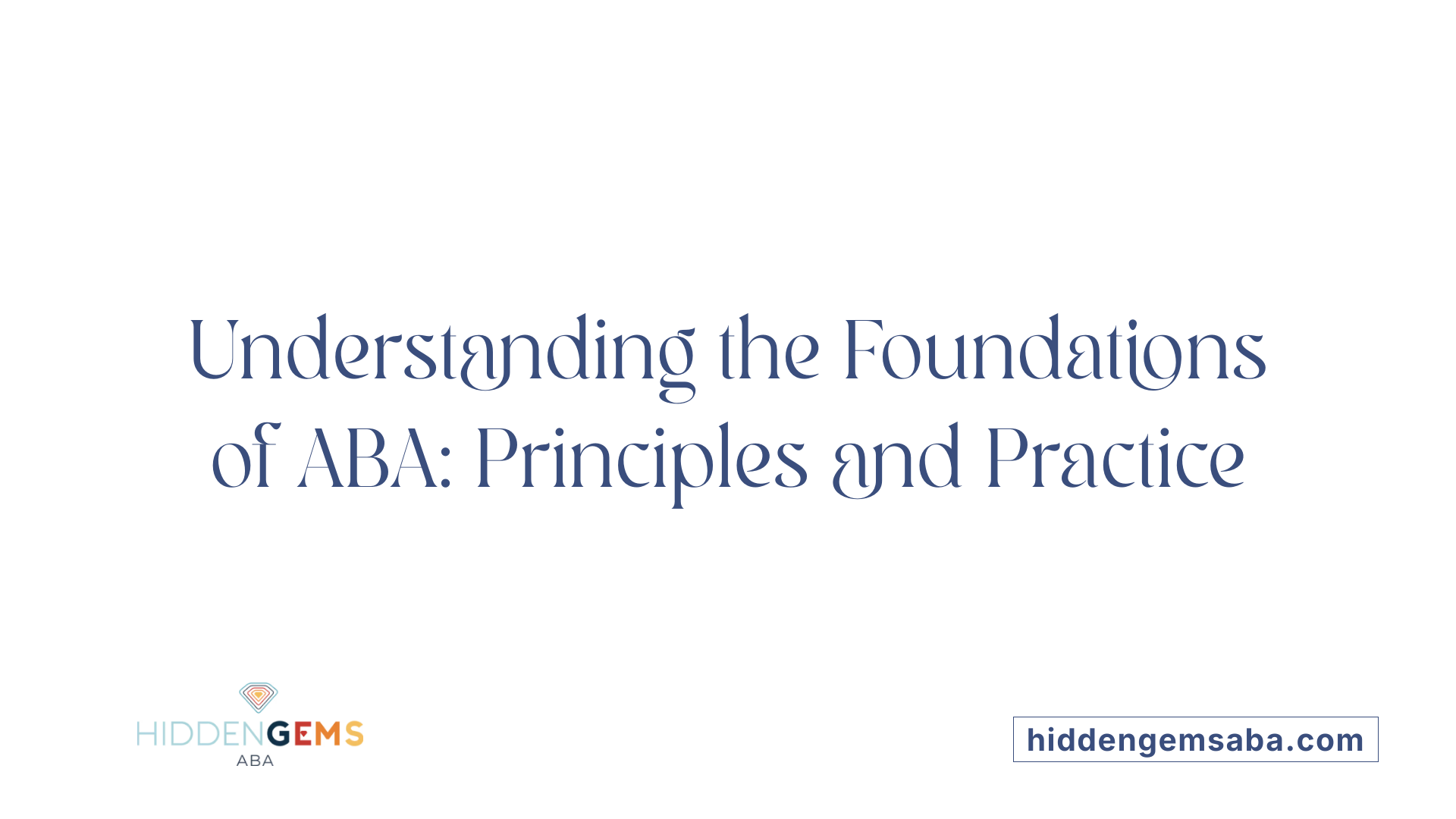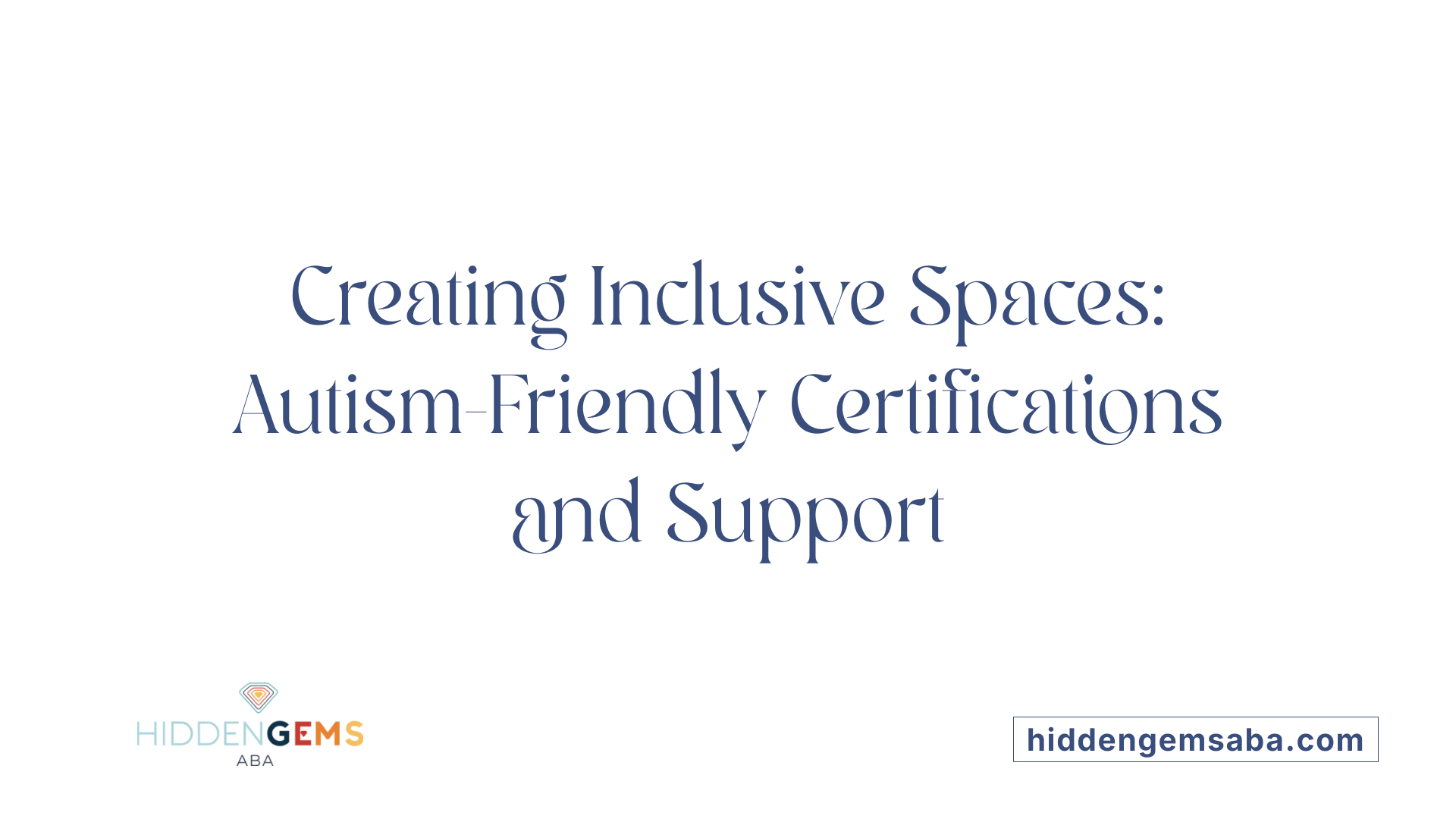Understanding Autism-Friendly Practices and BCBAs’ Role
As awareness of autism continues to grow, so does the importance of creating environments and services that are truly autism-friendly. This article explores the core principles of ABA therapy, the role of Board Certified Behavior Analysts (BCBAs), and practical strategies for fostering inclusive settings. From certification requirements to sensory accommodations, discover how BCBAs and organizations are enhancing support for individuals across all ages.
Core Principles and Philosophy of ABA Therapy for Autism
 ABA (Applied Behavior Analysis) therapy is a scientific approach based on the principles of learning and behavior. It focuses on understanding how environmental factors influence behaviors and how these behaviors can be shaped through systematic techniques.
ABA (Applied Behavior Analysis) therapy is a scientific approach based on the principles of learning and behavior. It focuses on understanding how environmental factors influence behaviors and how these behaviors can be shaped through systematic techniques.
At its core, ABA aims to identify the reasons behind specific behaviors—such as seeking attention, escaping a situation, accessing preferred items, or sensory stimulation—and then applying targeted strategies. These strategies often include positive reinforcement, prompting, modeling, and analyzing behavior patterns through the ABC (Antecedent-Behavior-Consequence) model.
A crucial aspect of ABA is its foundation in seven supported dimensions. These include effectiveness, generalization, technological rigor, and data-based decision making. Interventions are tailored to each individual, ensuring that progress can be measured accurately and behaviors can be transferred across different settings.
Practitioners use techniques like breaking skills into manageable steps, providing prompts, and encouraging natural environment teaching, all supported by ongoing data collection. The ultimate goal of ABA is to increase behaviors that enhance independence and social functioning, such as communication and daily living skills, while reducing harmful behaviors.
By fostering meaningful improvements, ABA helps individuals with autism achieve a better quality of life, promoting self-confidence, relationship-building, and self-advocacy.
BCBA Certification: Pathways and Requirements
The BCBA (Board Certified Behavior Analyst) credential is an essential certification for professionals working in applied behavior analysis (ABA). It signifies a high level of expertise in developing and implementing behavioral interventions, especially for individuals with autism and other developmental disabilities.
To earn this certification, candidates must meet specific educational and experiential requirements. First, they need to hold a master’s degree in behavior analysis, education, psychology, or a related field from an accredited institution. This educational background must include coursework covering core ABA principles, ethics, assessment, and data collection.
In addition to their academic qualifications, candidates must complete between 1,500 and 2,000 hours of supervised fieldwork. This hands-on experience is conducted under the guidance of a qualified BCBA supervisor, ensuring practitioners develop practical skills and adhere to professional standards.
The certification process culminates in passing the BCBA exam, a four-hour test featuring 185 multiple-choice questions. These questions assess knowledge across various areas, including the core principles of ABA, assessment strategies, treatment planning, and ethical considerations.
Maintaining BCBA certification involves ongoing professional development. Certified BCBAs are required to recertify every two years by earning 32 Continuing Education Units (CEUs) and staying current with ethical standards set by the Behavior Analyst Certification Board (BACB).
For those with advanced training, pathways such as the BCBA-D enable individuals with doctoral or postdoctoral degrees to practice independently without needing supervision for certain activities.
Overall, becoming a BCBA involves rigorous training and a deep commitment to ethical, evidence-based practice. It opens doors to a range of roles within clinical, educational, and community settings focused on improving lives through applied behavioral strategies.
Understanding Autism-Friendly Certifications and Support Strategies

What does it mean for a certification or service to be autism-friendly?
An autism-friendly certification indicates that a business or organization is committed to supporting individuals with autism by creating an accessible, understanding, and supportive environment. These services perform assessments and implement accommodations that reduce sensory overload and promote comfort.
Circle Care Services offers such a certification, which involves a comprehensive process led by a BCBA (Board Certified Behavior Analyst). The assessment includes evaluating sensory environments, staff training, and the provision of sensory tools to meet specific needs. Certified businesses display recognition through window stickers or wall certificates, signaling their commitment to inclusivity.
Examples of certified organizations
Certified organizations span diverse sectors, including:
- Dentists
- Cafes
- Play centers
- Theaters
- Retail stores
- Community programs
These groups participate in sensory-friendly initiatives to make their spaces welcoming. For example, a local theater with this certification may have dimmed lighting, reduced noise, and staff trained to handle sensory sensitivities.
Sensory accommodations and staff training
The certification process involves a BCBA visiting the business to assess the environment. Recommendations might include:
- Implementing sensory tool bins for stimulation regulation
- Adjusting lighting and sound levels
- Creating quiet zones
Staff receive training on autism-specific communication, behavior management, and sensory awareness, equipping them to better support their customers.
Supporting inclusivity in diverse settings
Implementing sensory-friendly options and staff education helps make various environments more inclusive. This not only benefits those with sensory sensitivities but also fosters broader community acceptance. Such efforts demonstrate a business's dedication to serving all community members, including families with sensory-sensitive members.
| Certification Element | Description | Additional Support |
|---|---|---|
| Sensory Assessments | Evaluation of sensory needs in the environment | Recommendations for improvements |
| Staff Training | Autism-awareness and sensory handling | Ongoing support from BCBA |
| Sensory Tools | Resources like sensory bins and calming aids | Maintains sensory comfort |
| Visual Certificates | Window stickers or wall certificates | Signals inclusivity |
With these measures, certified organizations create environments that are welcoming and accessible, promoting greater participation and comfort for individuals with autism.
Resources and Strategies for Supporting Autistic Clients Across Ages
 Supporting autistic clients effectively requires a variety of tailored resources and strategies that span different age groups. BCBAs have access to a range of assessment tools and curricula designed to guide individualized interventions. Examples include AIM, ABLLS-R, AFLS, PEAK, and VB-MAPP, which assist in evaluating skills, planning interventions, and tracking progress.
Supporting autistic clients effectively requires a variety of tailored resources and strategies that span different age groups. BCBAs have access to a range of assessment tools and curricula designed to guide individualized interventions. Examples include AIM, ABLLS-R, AFLS, PEAK, and VB-MAPP, which assist in evaluating skills, planning interventions, and tracking progress.
Developmentally appropriate activities are essential for meaningful progress. For young children, play-based strategies help develop communication and social skills, while structured routines benefit school-aged children by fostering academic and social growth. For adolescents and adults, focusing on life skills and community integration promotes independence.
Family involvement plays a vital role in success. Providing families with training on ABA principles and tailored strategies encourages consistency and enhances skill generalization. Resources like workshops, support groups, and educational materials are widely available to facilitate family participation.
Multidisciplinary collaboration enhances outcomes by integrating insights from educators, speech therapists, occupational therapists, and other professionals. Using collaborative tools and team-based approaches ensures interventions are comprehensive and aligned with the individual's needs.
Reputable organizations, such as the US Surgeon General and the American Psychological Association, offer guidelines and evidence-based practices that support treatment across the lifespan. All these resources and strategies work together to create a supportive environment that promotes skill development, independence, and overall well-being for autistic clients at every age.
Creating Autism-Friendly Environments and Career Opportunities for BCBAs

How can behavior analysts create supportive environments that are autism-friendly?
Creating supportive, autism-friendly environments involves several thoughtful strategies. Implementing sensory accommodations such as adjustable lighting, noise reduction strategies, and designated quiet zones helps minimize sensory overload, which can be overwhelming for many autistic individuals. Visual supports, including schedules, social stories, and cue cards, foster a sense of predictability and reduce anxiety.
Structuring spaces to promote routine, clarity, and flexibility is essential. Clear signage and consistent routines make transitions smoother and enhance independence. Personalizing supports based on individual sensory preferences ensures the environment respects each person’s unique needs. Overall, fostering acceptance, providing predictable routines, and integrating sensory and social supports help create inclusive spaces that honor diverse sensory and social profiles.
What are potential career paths for BCBAs working with autism, and what are suitable work environments?
For Board Certified Behavior Analysts (BCBAs), career opportunities are broad and varied. They can work in clinics, schools, and community programs, or provide services directly in homes. In addition to traditional settings, BCBAs are increasingly involved in research, clinical development, and academia.
Emerging roles include working within healthcare systems to develop behavioral interventions in hospitals or mental health centers. Many BCBAs also explore organizational behavior management, improving performance within corporate settings. Digital health platforms, telehealth services, and app-based interventions provide new avenues for outreach and support.
Career paths also extend to private practice, consulting, or founding behavioral health agencies. Developing educational tools and resources is another option. These diverse pathways enable BCBAs to broaden their impact, requiring adaptability, ongoing learning, and a dedication to evidence-based practices.
| Pathway | Typical Settings | Additional Notes |
|---|---|---|
| Clinical services | Clinics, hospitals | Focus on direct intervention and therapy |
| Educational roles | Schools, universities | Training, research, program development |
| Community programs | Local centers, NGOs | Support for families and community inclusion |
| Healthcare integrations | Hospitals, mental health | Medical behavioral supports |
| Digital platforms | Telehealth, apps | Innovative remote service options |
| Entrepreneurship | Private practice, startups | Independent ventures and resource creation |
Advancing Autism Support Through Certified, Environmental, and Professional Excellence
The path toward creating truly autism-friendly environments involves a combination of scientifically grounded ABA practices, specialized certifications like those from Circle Care Services, and dedicated professionals committed to continuous learning. BCBAs play a pivotal role in designing and implementing effective interventions, advocating for sensory-friendly spaces, and fostering inclusive community settings. By understanding the core principles of ABA, obtaining the right certification, and embracing a holistic approach that includes sensory supports and family involvement, professionals can significantly enhance the quality of life for autistic individuals at every stage of life. The expanding career opportunities and resources available empower behavior analysts to lead the way in autism support and inclusion.
References
- Become Sensory Friendly Certified
- What can ABA offer young adults with autism?
- ABA Therapy Blog
- The 7 Dimensions & Core Principles of ABA
- Applied Behavior Analysis (ABA)
- What Is Applied Behavior Analysis - Exploring ABA ...
- The Science of ABA: Understanding the Principles ...
- Applied Behavior Analysis in Children and Youth with ...
- Adapting your environment
- Accessible environments




